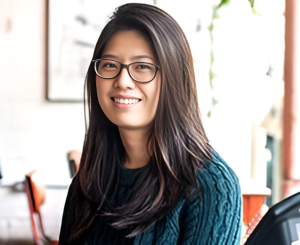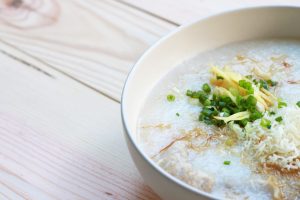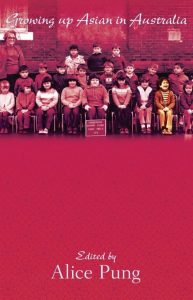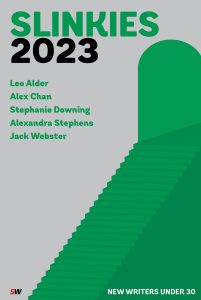
We are excited to introduce you to Alex Chan, the author of ‘Congee for Breakfast’ in Slinkies 2023. Alex’s piece dives into the aftermath of a breakup and fighting the obstacles that life throws at you. In this interview, Alex talks about overcoming writer’s block, her current guilty pleasure genre to read and her writing aspirations. Read her story ‘Congee for Breakfast’ in Slinkies 2023, out December 1st! Pre-order your copy for $19.99 to read ‘Congee for Breakfast’ and other short stories. Join us for the highly anticipated Slinkies 2023 Book Party on October 26th!
About Alex
Alex is an Australian-Chinese writer. She wrote her first story when she was six – it was about mermaids. Her work has now evolved to explore themes of multicultural identities and belonging. She lives in Melbourne with her partner and cat.
How do you overcome writer’s block?
For three years during my undergrad degree, I wrote an average of one essay a week. This was not a situation in which writer’s block was a forgivable offence. As such, the key thing I learned while at university (sorry to my music degree) is that the way to overcome writer’s block is to get words on a page. It doesn’t matter if the words you write are terrible, or if you don’t end up using them, or quite frankly, if it’s just the title of the piece: the most important thing is that you actually committed words to the page. You can always come back later and rewrite them.
In all seriousness, I try not to think about ‘writer’s block’ per se. If I’m feeling 'uninspired’ or 'creatively stunted’, my top three strategies for getting over it are: going outside and people-watching, reading, and having a cup of coffee with a friend.
What book is your guilty pleasure?
Maybe not a singular book, but at the moment, definitely a particular genre: feminist retellings of classical Greek and Roman myths. In the last year alone, I’ve picked up works focusing on Medusa, Elektra and Penelope. I think it’s probably a natural progression from growing up watching Hercules and reading the Percy Jackson series.
I also enjoy doing an annual re-read of many childhood and young adult favourites, including the Australian classics 'Saving Francesca' (Melina Marchetta) and 'The Tomorrow Series' (John Marsden). It is nice to revisit the books that made me fall in love with fiction in the first place.
Do you have a favourite Chinese food? Do you yourself enjoy congee?
My family are Malaysian-Chinese, so most of the Chinese food that I grew up with and, therefore, love is more Malaysian-Chinese. My comfort meal is a big steaming bowl of soup noodles like laksa or Ipoh hor fun.
I do genuinely love congee. My mum used to make congee – though we called it porridge, imagine my shock when I found out that oats existed – with chicken or fish when I was a kid, and it was the perfect meal in the winter. The two toppings I mention in ‘Congee for Breakfast’ are condiments my grandpa loves. These days, I don’t eat much congee except when I can badger my partner to make some for me.

Who has inspired you on your journey as a writer?
I’ve always read lots of fiction – as a child, on my school holidays, I would easily power through ten or more books if I could get my hands on them. As a result, it’s difficult to pinpoint exactly who has inspired me on my writing journey, simply because I have no doubt that I’ve pulled inspiration from every book I have read in one way or another.
 If I were to try and narrow it down, I would have to say Australian authors Alice Pung and Benjamin Law were both inspirations - their works were what inspired me to actually try and tell stories about people like me. Alice Pung’s anthology ‘Growing Up Asian in Australia’ opened my eyes to the power of representation in storytelling because I finally felt able to relate to many of the protagonists in this collection of work. It felt like a full circle earlier this year when she and Christos Tsiolkas chose my work to be featured in this year’s ‘SBS Emerging Voices’ anthology! The vignettes in Benjamin Law’s book 'The Family Law’ still make me laugh to this day with the nuances and complexities of family dynamics explored both with interwoven themes of identity and a sharp, self-deprecating humour.
If I were to try and narrow it down, I would have to say Australian authors Alice Pung and Benjamin Law were both inspirations - their works were what inspired me to actually try and tell stories about people like me. Alice Pung’s anthology ‘Growing Up Asian in Australia’ opened my eyes to the power of representation in storytelling because I finally felt able to relate to many of the protagonists in this collection of work. It felt like a full circle earlier this year when she and Christos Tsiolkas chose my work to be featured in this year’s ‘SBS Emerging Voices’ anthology! The vignettes in Benjamin Law’s book 'The Family Law’ still make me laugh to this day with the nuances and complexities of family dynamics explored both with interwoven themes of identity and a sharp, self-deprecating humour.
My mother, for making me congee and also for getting me every book I wanted and very much facilitating the start of this journey. Finally – my partner. He’s got his own book on the go, and whenever I’m feeling lazy or uninspired, I remember his persistence and creativity.
What are your future aspirations as a writer?
I’m currently writing a novel! So, the first step is finishing that. It is a piece of writing that I’m excited about because it’s an opportunity to marry my two creative interests, writing and music. It’s the most ambitious piece I’ve attempted so far, not just in length but in scope, and I really have to dig deep and remember all of the research from my music degree that has been lying dormant for years.
In the future – who knows? I unexpectedly have found myself loving the short story form. I would love to write for more anthologies or collections. It’s a real honour to have my work included amongst other incredible writers.
Can you describe your writing process?
To call it a ‘process’ is probably a bit of an overestimation! I can describe what I would call a ‘pattern’ that I’ve observed when I’m writing.
I plan a lot in my head before anything goes onto the page – almost like an internal vetting system. Storylines, scenes, even down to sentences, I workshop mentally and iterate until I’m happy with it. What this means is that by the time I sit down to write, I often have fully formed ideas ready to go onto the page. It also means that you can often find me daydreaming on the train, taking a long time to make a coffee, and not being able to fall asleep, all because I’m actually thinking and imagining and plotting about stories I want to write.
When I do finally sit down to write, I try to get words out with the idea of proofreading and editing later. This does actually help me a lot. I find it easier to work when there is an existing structure, not least because I'm easily distracted and can find myself going on tangents otherwise. For what I consider more difficult scenes to write, I leave until I have space to write. I work during the week, and I often don’t feel I have the energy to get to my writing mindset when I get home. I like to find a couple of hours that are completely free, arm myself with a cup of coffee, remove all distractions such as music, Netflix and my clingy cat, and just write. As I said before, I try to overcome writer’s block by getting any words down on the page, and by persevering this way, I always find myself with a finished work that I am happy with – which is the main thing!
 How long was Congee for Breakfast in the works?
How long was Congee for Breakfast in the works?
I first got the idea for this particular story in the lead-up to my wedding last November. That sounds bad, given that the story begins with the breakdown of a relationship, but I think in my stress-fuelled state, I started catastrophising about what it would be like to lose it all. But the more I thought about it, Halley’s voice started emerging – and she was determined to fight her way out of it, even when things kept being thrown at her. Connie was added as both an obstacle and a guide, a medium for those anxious thoughts, whereas Tai was like the angel on the other shoulder. So, after thinking about these three characters and their interactions with each other for a few months, I actually started putting words to a page in April.
